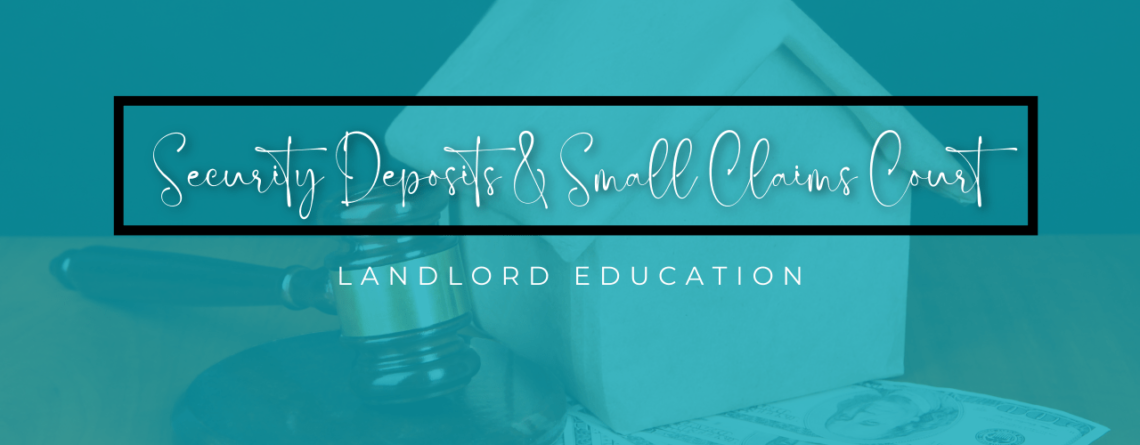Security Deposits & Small Claims Court | Orlando Landlord Education
When you’re renting out an Orlando property, the last place you want to find yourself is small claims court. If you’re there, it’s likely because a tenant has brought a lawsuit over a security deposit dispute. In fact, most landlord and tenant conflicts we hear about have something to do with the return of a tenant’s security deposit.
As you probably know, security deposits are collected at the beginning of the lease term, once you have already approved a tenant for your property and signed the lease agreement. The security deposit protects you against potential tenant damage, unpaid rent, and a lease break.
Collecting the Orlando security deposit is fairly easy. Florida has some specific laws on where you need to hold it, but there’s no limit to what you collect, and you don’t have to put the deposit into an interest bearing account if you choose not to.
Returning the security deposit depends on the condition of your property and whether the tenant has an outstanding balance on their account.
It’s important that you understand how to manage the security deposit return in Orlando and what you can do to prevent conflicts and potential lawsuits that land you in small claims court.
Collecting and Holding Orlando Security Deposits
When you collect the security deposit, you’re required to hold it in a Florida bank. There must be a physical branch in the state of Florida for said bank. So if you’re investing in Orlando rental properties from out of state, make sure you have an account in a local bank that can hold the security deposit funds.
Once you’ve chosen a bank, you’ll need to decide if you’re going to hold the deposit in an interest-bearing account or a non-interest bearing account. There is no legal requirement here, the choice is yours. But, if you choose an interest bearing account, you’ll need to pay the interest to your tenant.
Wherever you put the money, you’re required to disclose to your tenant what kind of account it is within 30 days of collecting the deposit.
Understanding these requirements for collecting and holding the deposit will ensure the security deposit doesn’t become a problem for you before the end of the lease term, when you’ll need to be focused on what you can and cannot withhold from that deposit.
Check for Property Damage during a Move-Out Inspection
You cannot return the deposit or make any decisions about deductions until you’ve inspected the property after your tenants have moved out.
Hopefully, you were thorough during the move-in inspection. There should be a move-in condition report that notes any pre-existing damage and includes photos to support the condition of the property. Use that report as your guide while you inspect after a tenant has left.
You’re looking for damage that goes beyond normal wear and tear.
Here’s the best case scenario for everyone involved: you conduct your move-out inspection and find the property in excellent shape. The home is left in the same condition that it was when your tenants took possession. It’s clean, everything is removed, and there’s no damage. Maybe you’ll have to do a little painting and make some cosmetic improvements during the turnover period, but you can see you’re in good shape.
It’s easy to manage the security deposit in this situation. You’ll return it directly to your residents within 15 days of them moving out.
Things get more complicated when there is evidence of damage or other reasons to withhold some or all of the deposit.
Acceptable Security Deposit Deductions for Orlando Rental Homes
A lot of rental property owners are unsure of what they should be looking for, or how they should justify keeping all or part of a tenant’s security deposit. Make any deduction that you are completely confident will stand up in court. That should be your thought process when deducting from the deposit: will a judge see this your way?
Here are the legally acceptable reasons to withhold a security deposit:
- Unpaid rent
A security deposit can cover any unpaid rent. We know that some tenants may avoid paying rent the last month they’re living there. That’s likely a violation of your lease agreement, and you don’t want this to happen. But, if it does, you can use the security deposit to cover that unpaid rent. You can also use it to catch the account up with any missing or partial payments that occurred throughout the tenancy.
- Lease breaks
If your tenant breaks the lease and leaves before the end of the lease term, you can use the security deposit to cover the rent until you find a new tenant. In this case, the security deposit funds can make up for the income you’ve lost. However, work quickly to find a new tenant so you don’t have to worry about months and months of vacancy loss. The security deposit will only cover you for so long.
- Overdue utility bills
When tenants don’t pay the utility bills, it can prevent you from turning the accounts back in your own name. Or, perhaps you were covering the cost of the utilities and billing the tenants back based on usage. However you’re set up, if a tenant moves out and the utility accounts are overdue, you can use the tenant’s security deposit to pay for any overdue or unpaid utility bills.
- Property damage beyond wear and tear
Your tenant is responsible for any damage to your property that goes beyond normal wear and tear. This should be stated very clearly in the lease agreement. Any damage to your investment is always the responsibility of your tenant, even if that damage is unintentional. Usually, it occurs when something is used improperly or attention is not paid to the care and condition of floors, walls, appliances, etc.
When you’re conducting your move-out inspection, some of the damage you might encounter could include gaping holes in the walls, large scrapes or noticeable stains on the floors, damaged appliances, broken windows, and evidence of neglect. There might be drawing on the walls or cabinet doors hanging from their hinges. These things qualify as damage. You can use the security deposit to pay for these repairs, but it’s important to collect the proper documentation so you can prove the property didn’t look like that when your tenants moved in.
- Move-out cleaning costs
Everyone has a different standard of what defines clean. You can expect your tenants to return the property to you as clean as it was when they began leasing it. Once you receive your tenant’s notice to vacate, send instructions with very specific cleaning requirements so they’ll understand what they’re responsible for.
Cleaning charges against the security deposit are common when trash is left behind or belongings need to be hauled out because they were not removed before the tenants left. Security deposits can be used to cover any cleaning costs that are necessary because the tenant did not clean adequately before leaving.
Protect Yourself against Unlawful Security Deposit Claims
Damage and unpaid bills and cleaning are all acceptable reasons to make deductions from the security deposit. You can make those repairs and then deduct what you return to your tenant.
However, normal wear and tear is your responsibility as a landlord. You’ll have to pay for these things with your own funds, not your tenant’s.
What is the difference between wear and tear and damage?
It’s easy to distinguish these classifications as an Orlando property manager who has been managing move-out inspections and security deposits for years. Sometimes, however, landlords have trouble understanding whether they’re looking at routine deterioration or property damage.
Some examples of wear and tear are:
- Small nail holes in the walls from where pictures or mirrors or clocks were hung.
- Scuff marks on walls or floors from where furniture was resting.
- Dents in the carpet from heavy furniture.
- Chipping or worn caulk between tiles in bathrooms.
- Weather stripping pulling away from doors.
These are the types of things that you must repair at your own expense before a new tenant moves into your property.
How to Return Your Orlando Security Deposit without Tenant Disputes
Avoiding small claims court and angry tenants depends on how you return your security deposit.
The timeline you follow to return the deposit depends on the condition of your property:
- Florida law requires landlords to return a tenant’s security deposit within 15 days of move-out if there are no reasons to deduct money from that deposit.
- When you deduct for tenant damage, cleaning costs, or past due rent and utilities, you’ll have to return the remaining deposit and a detailed accounting within 30 days.
You will send the deposit to the forwarding address provided by your tenants and if applicable, you’ll also send your tenants an itemized statement of what was withheld and why. Include invoices, receipts, and any other documentation that will make your case for keeping all or some of the tenant’s deposit.
Always return the security deposit to your departing Orlando tenants on time. Otherwise, your tenants can take you to small claims court, where you may be ordered to refund the entire deposit and pay a penalty. Plus, you could face additional court costs and legal fees.
 Security deposits can be a challenge. Please don’t hesitate to contact us at Homevest Management when you need help. We provide expert Orlando property management, real estate, property rentals, and HOA management serving all of Central Florida, including Winter Garden, Doctor Phillips, Baldwin Park, Winter Springs, and Windermere.
Security deposits can be a challenge. Please don’t hesitate to contact us at Homevest Management when you need help. We provide expert Orlando property management, real estate, property rentals, and HOA management serving all of Central Florida, including Winter Garden, Doctor Phillips, Baldwin Park, Winter Springs, and Windermere.











